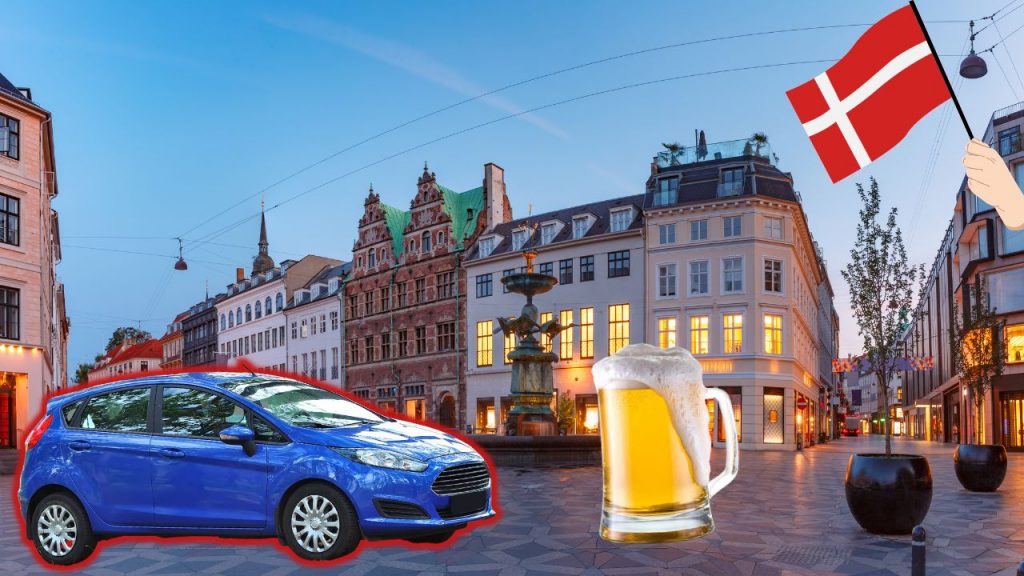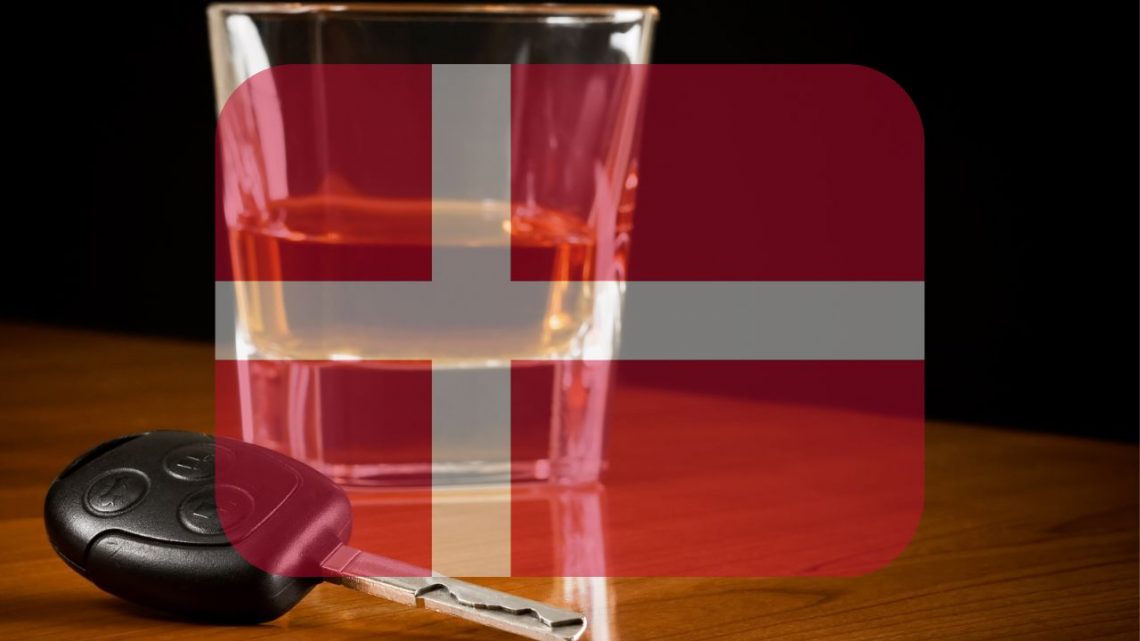In Denmark, driving regulations stipulate that individuals behind the wheel must maintain a blood alcohol content (BAC) below 0.05%, equivalent to less than 0.5 grams of alcohol per liter of blood.
This article intends to increase awareness about the consequences of drunk driving in Denmark. The information provided on this website does not support or encourage impaired driving, regardless of geographical location or legal jurisdiction.
What is the legal alcohol limit for driving in Denmark?
In Denmark, the law is clear and uniform for all drivers regarding alcohol consumption before driving. The legal limit for blood alcohol content (BAC) is set at 0.05%. This standard applies to every individual who operates a vehicle, ensuring that the roads remain safe for everyone. This limit is strictly enforced to minimize alcohol-related accidents and promote responsible driving across the country.
Drink and Drive Penalties and Punishments in Denmark
Denmark takes a stringent approach to enforcing road safety, particularly when it comes to drink-driving. The legal alcohol limit for drivers was established in 1998 at 0.05%, and there has been no adjustment to this limit for any specific group of drivers. The country has consistently toughened the sanctions for drink-driving offenses since 2005, underscoring its commitment to road safety.
Denmark utilizes an income-related system for penalizing drink-driving offenses, akin to the model used in Finland. This system ensures that fines are proportionate to the offender’s ability to pay, aiming to deliver a fair and effective deterrent against drink-driving. Below is an outline of the penalties imposed for first-time offenses, categorized by blood alcohol content (BAC) levels:
- For BAC levels from 0.51 to 1.2g/L: Fines are calculated as the offender’s net monthly income multiplied by the BAC level. Offenders face a conditional withdrawal of their license and must complete a mandatory 12-hour course on “Alcohol, Drugs and Traffic,” in addition to passing a new theory and driving test.
- For BAC levels from 1.21 to 2.0g/L: Penalties include fines based on the net monthly income multiplied by the BAC level, an unconditional license withdrawal for three years (with the possibility of conversion to a driving period with an alcohol interlock), and the same mandatory course and tests as the lower tier.
- For BAC levels above 2.0g/L: Offenders are fined one month’s net income, face unconditional license withdrawal for three years followed by two years with a mandatory alcohol interlock (or a total of five years without a license), a conditional 20-day prison sentence, vehicle confiscation, and are required to complete the mandatory course, tests, and a 2-year period with an Alcohol Interlock.
Repeat offenders face harsher penalties, including longer periods of unconditional license revocation (3 years, 5 years, or more), suspended prison sentences, mandatory participation in an alcohol interlock program, fines, and possible car confiscation. To regain their driving license, offenders must complete the Alcohol, Drugs, and Traffic (ANT) course and pass the driving test anew.
Rehabilitation and Alcohol Interlock Programs
- Alcohol Traffic Courses (ANT course): Aimed at offenders looking to regain their driver’s license after a drug or drink-driving conviction, this 12-hour course (spread over four sessions) is priced at around 400 euros. It’s conducted by accredited professionals across the Danish regions.
- Alcohol Interlock Program: Introduced in 2015, this program targets first-time high-level offenders and repeat offenders, offering both voluntary and mandatory participation options based on BAC levels at the time of the offense. Currently, around 450 drivers are enrolled in this program, highlighting its role in rehabilitation efforts.
Given the evolving nature of road safety regulations and the potential for updates to penalties and rehabilitation programs, drivers and residents are encouraged to frequently check the official Danish government website for the most current information. This ensures awareness of the latest laws and the consequences of drink-driving, reinforcing the importance of safe and responsible driving practices.
How Can I Calculate If My Alcohol Blood Limit Is Legal in Denmark?
In Denmark, the police use breathalyzers and blood tests to determine a driver’s blood alcohol content (BAC). These methods are precise and reliable, providing immediate results that indicate whether a driver has exceeded the legal limit of 0.05%. It’s crucial for drivers in Denmark to understand their BAC level to ensure they are within legal limits and to promote road safety.
As a former phlebologist with a decade of experience, I recommend two approaches for individuals to self-assess their BAC levels:
- Use a High-Quality Alcohol Breathalyzer: For those seeking a reliable way to measure their BAC, the BACtrack S80 stands out as a top option available in Denmark. This device offers professional-grade accuracy and is both DOT & NHTSA approved and FDA 510(k) cleared. Based on my extensive experience, the BACtrack S80 is highly accurate and can serve as a crucial tool for anyone wishing to gauge their alcohol levels. Keeping one in your car can be a wise decision, especially in a culture where people might underestimate their impairment level.
- Utilize a BAC Calculator: Alongside other phlebologists and with the help of web developers, I’ve created an online BAC calculator. This tool is designed to estimate your BAC based on various factors such as alcohol intake, weight, and time elapsed since drinking. It’s a helpful resource for those who prefer a quick online check before deciding to drive.
It’s important to note that while both these methods offer a good indication of your BAC level, they do not guarantee 100% accuracy. Conditions such as metabolism, medication, and health status can affect the results. Therefore, these tools should primarily be used to err on the side of caution. If there’s any doubt about your sobriety, the safest choice is not to drive. By staying informed and cautious, we can all contribute to safer roads in Denmark.
Ways to Avoid Driving with a High BAC in Denmark

Ensuring you remain under the legal blood alcohol content (BAC) limit in Denmark is crucial for your safety and that of others on the road. If you plan to consume alcohol, it’s wise to have alternative transportation options in mind. Here are effective strategies to avoid driving with a high BAC:
- Utilize Taxi Apps and Local Taxi Services: In many Danish cities, there are convenient and reliable taxi services that can be easily accessed through apps or direct calls. In Copenhagen, consider using Viggo, an eco-friendly taxi service that offers a smooth booking experience through their app. Aarhus residents can rely on Aarhus Taxa for safe and quick transportation within the city. These services provide a hassle-free way to get home safely without the risk of drink-driving.
- Order a Designated Driver Service: If you’ve driven to a location and find yourself unable to safely drive back due to alcohol consumption, a designated driver service is an excellent solution. Services such as Copenhagen Concierges in Copenhagen and Infinity Luxe Chauffeur in Aarhus offer professional drivers who can drive you home in your own car. This way, you won’t have to worry about leaving your vehicle behind or compromising on safety. To find a designated driver service near you, a simple online search for “designated driver service” followed by your city name will provide relevant options.
By planning ahead and choosing safe transportation alternatives, you can enjoy your outings without putting yourself or others at risk. Remember, the goal is to ensure everyone gets home safely, so making use of these convenient services in Denmark can help you adhere to the legal BAC limits and enjoy a worry-free experience.
Sticking to Drink and Drive Laws in Denmark: Sad Statistics
From 2010 to 2018, Denmark saw a significant reduction in alcohol-related road fatalities, halving from 64 to 32, indicating a consistent annual decrease in such incidents. However, the decline plateaued between 2016 and 2019, despite ongoing efforts in education, law enforcement, and penalization, suggesting that the initial measures had already tapped much of their potential.
Driving under the influence poses a grave risk not just to the driver but to all road users, highlighting the importance of choosing alternative transportation methods like taxis or designated driver services after consuming alcohol. Awareness and adherence to local drunk driving laws are crucial for safety, and tools like breathalyzers can assist individuals in making responsible decisions about driving.
For detailed information on regulations and safe driving practices, visiting the official Danish drunk driving campaign website is recommended. Staying informed and conscientious of one’s BAC level is essential for maintaining road safety and complying with legal standards in Denmark.







